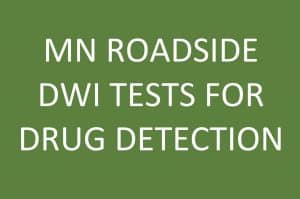Minnesota Roadside DWI Tests Starting for Marijuana (THC) & Other Drugs
Minnesota law enforcement officers are beginning to ramp up DWI detection for marijuana (THC). Starting this month, police will use roadside tests not previously deployed in the field. One, is the SoToxa Oral Fluid Mobile Analyzer and the other is the Drager DrugTest 5000. Fancy names for devices that test for, what is being marketed as recent and accurate, drug use. Not only are these device companies claiming they can test for recent THC ingestion, but other drugs such as amphetamines, cocaine, opiates, benzos, and methadone.
The SoToxa fancy device is an Abbott product. To work, a jumbo-eye-dropper-type piece of plastic needs to go in the person’s mouth to collect an oral fluid sample. The collector piece of plastic then goes into the handheld device and is supposed to detect up to six drug lasses within five minutes. To get to this point in the DWI encounter, it is likely that the officer will need reasonable articulable suspicion of criminal activity (i.e. driving while under the influence of drugs) – like an alcohol-related DWI when the officer asks a driver to submit to a PBT (preliminary breath test). The officer will use the results of such tests to determine whether probable cause exists to arrest someone on suspicion of DWI. That will lead to another test, called an evidentiary test. In drug cases, currently, the evidentiary tests are blood or urine tests, which require a warrant for collection.
The Drager DrugTest 500 is similar to the SoToxa device in that an oral fluid sample is collected from the person. The officer then takes the collected sample and places it into a larger device that is the shape of a small coffee maker. The company claims quick and simple operability with accurate results. It also claims to be non-invasive, which will likely be evaluated by Minnesota courts in the not-too-distant future. In alcohol-related DWIs, Minnesota Appellate Courts, and the United States Supreme Court, determined breath testing was not physically invasive to require a warrant, but that blood and urine testing was. The drug-related oral fluid collection samples will likely be deemed more invasive than a breath test, but will it be as invasive as a blood or urine test will be something the courts will assuredly determine in the near future.
For a case review at no charge, contact us by phone or text at: 612-547-3199. You can also reach us by email at: ambroselegal@icloud.com.
Robert H. Ambrose is a criminal defense lawyer and DWI attorney in Minnesota. Super Lawyers named him Super Lawyer the past two years and a Rising Star the previous six years. He is an adjunct professor at the University of Minnesota Law School. DWI Lawyer Woodbury MN, Criminal Defense Attorney Minneapolis MN, Criminal Attorney Minnesota.

